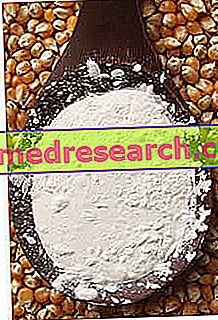Generality
The cornstarch is refined cornstarch in powder form, to NOT be confused with the corn flour which is integral ;

The cornstarch is a very fine white flour, almost identical to the "00" type wheat flour or to the refined rice flour.
The production difference between cornstarch and the other flours deprived of the fiber lies in the order of the various processing steps. For that of wheat, for example, first the grinding takes place and then the sieve that separates the bran from the flour; on the contrary, cornstarch is obtained by:
- Deprivation of the bran (external fibrous coating) and of the germ (embryo or "living" portion of the seed, rich in polyunsaturated fats and vitamins)
- Milling of the endosperm (which contains the vegetable reserve of starch).
Compared to the already mentioned derivatives, from a chemical and nutritional point of view, cornstarch has a higher carbohydrate content and a lower quantity of water, lipids and proteins; the maizena therefore boasts a greater energy density.
In contrast, corn flour corresponds to the "integral" derivative of corn seeds.
Use and destination of cornstarch
The cornstarch has two very important characteristics that determine its use in the kitchen:
- It does NOT contain gluten: it is therefore widely used in preparations for the celiac diet, as well as rice flour and potato starch
- It contains more starch but less water, proteins, lipids and non-viscous fibers compared to other flours: this characteristic gives it a greater thickening power compared to other derivatives.
With regard to the second point, we recall that cornstarch constitutes a natural (therefore harmless) "food additive" with the characteristics of a thickener and anti-agglomerant.
The cornstarch is also used in the cosmetic industry and as an alternative home remedy against various ailments; in beauty products, cornstarch has the main function of skin softener, while if applied topically or used diluted in a hot bath it is useful in reducing rashes (hives, solar dermatitis, etc.).
The cornstarch is also aimed at many other productions that have nothing to do with food or cosmetics, such as the paper industry, lubricants or detergents.



